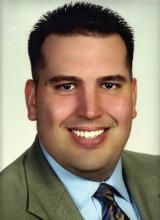HUNTINGTON BEACH, CALIF. - Underrecognized and undertreated obstructive sleep apnea is the most likely cause of unexplained deaths following bariatric surgery, according to results of a small pilot study.
Because of that, continuous positive airway pressure (CPAP) and continuous pulse oximetry monitoring – with alarms to alert nursing staff to hypoxic episodes and rouse oxygen-desaturated patients from sleep – should be included in postoperative care, said Dr. Scott Gallagher, a bariatric surgeon at the University of South Florida, Tampa, where the study was conducted.
In previous work, the researchers found that severe, prolonged, and frequent arterial hypoxemia is common in sleeping bariatric surgery patients. They sought to determine why such patients – who seemed to be doing well after surgery – died suddenly in their sleep, without pulmonary embolism or any other obvious cause. In 15 gastric bypass patients monitored for 24 hours after surgery, they found that the average episode of hypoxemia lasted 21 minutes, and the longest for hours. Blood oxygen saturation fell as low as 60% (J. Surg. Res. 2010;159:622-6).
Right-to-left shunt, diminished inspired oxygen partial pressure, and other textbook explanations did not provide a rationale for the hypoxemia. Such causes "didn’t exist in these patients," Dr. Gallagher said.
That left either postoperative, narcotic-induced hypoventilation or obstructive sleep apnea as the most likely explanation. Narcotic pain control is common after bariatric surgery, as is sleep apnea.
Dr. Gallagher and his team measured carbon dioxide partial pressures transcutaneously (PtcCO2) to gauge hypoventilation in 20 patients (14 female) during the first 24 hours after Roux-en-Y gastric bypass. Patients also wore blood oxygen saturation (SpO2) ear-clip sensors.
Their mean body mass index was 54 kg/m2, and 15 were diagnosed with obstructive sleep apnea. All were on postoperative narcotics.
As in the previous study, all the patients had multiple episodes of prolonged hypoxemia, with a mean of 191 episodes per patient lasting a mean of 1 minute.
Mean SpO2 was 94%, and mean minimum SpO2 was 60%. Patients spent about 5% of their time (75 minutes) with SpO2 below 88%; hypoxemia lasted longer than 5 minutes in three patients.
All patients also had mild hypercarbia, suggesting mild, chronic hypoventilation.
They had a mean PtcCO2 of 44 mmHg and a mean maximum of 56 mm Hg. The maximum PtcCO2 value recorded in any patient was 75 mm Hg. Heart rates temporarily dropped below 50 bpm in 14 patients.
However, "in no patient could hypoxemia be explained entirely by hypoventilation, and there was no obvious relationship between hypoxemic episodes and [hypoventilation]," said Dr. Krista Haines, a recent University of South Florida graduate now with the University of Nevada, Las Vegas, who presented the findings at the annual Academic Surgical Congress.
The mild hypoventilation by itself was "not clinically significant," leaving obstructive sleep apnea as the most likely cause of hypoxemia following bariatric surgery, Dr. Gallagher stated.
As far as the unexplained deaths go, Dr. Gallagher and his team believe that once patients desaturate, the mild narcotic-induced hypoventilation pushes a few of them over the edge, though no one died in the study.
Because sleep apnea is the likely root cause of such deaths, Dr. Gallagher recommends routine postoperative monitoring of bariatric surgery patients. "[Apneics] need to have their CPAP on" after surgery, especially when receiving narcotics, he said.
CPAP and postoperative monitoring are necessary until sleep apnea resolves, usually after a weight loss of 50-75 pounds. In his study, he noted that 14 patients had machines but still desaturated. Barring faulty gear or incorrect settings, that means the machines weren’t being used throughout the night.
He also pointed out the supplemental oxygen used in the study didn’t prevent hypercarbia or hypoxemia and seems to have no therapeutic role at this point.
In many places, sleep apnea screens, CPAP, and nighttime pulse oximetry are not the standard of care following bariatric surgery, Dr. Gallagher said.
Dr. Stefan Holubar, a colorectal surgeon and comoderator of the session, thinks that needs to change.
"The standard of care should include formal obstructive sleep apnea [screening] for all patients undergoing bariatric surgery, or they should all be empirically treated [with CPAP] regardless of whether or not they have the diagnosis," said Dr. Holubar of Dartmouth-Hitchcock Medical Center in Lebanon, N.H.
"Although it’s a small pilot study, there are profound implications," he added.
The study "is a great start," said comoderator Dr. George Chang, a colorectal surgeon at that University of Texas at Houston. But the team needs to "demonstrate an association between unexplained deaths and these measures. You’d have to do a very large long-term study to see if those unexplained deaths go down."



